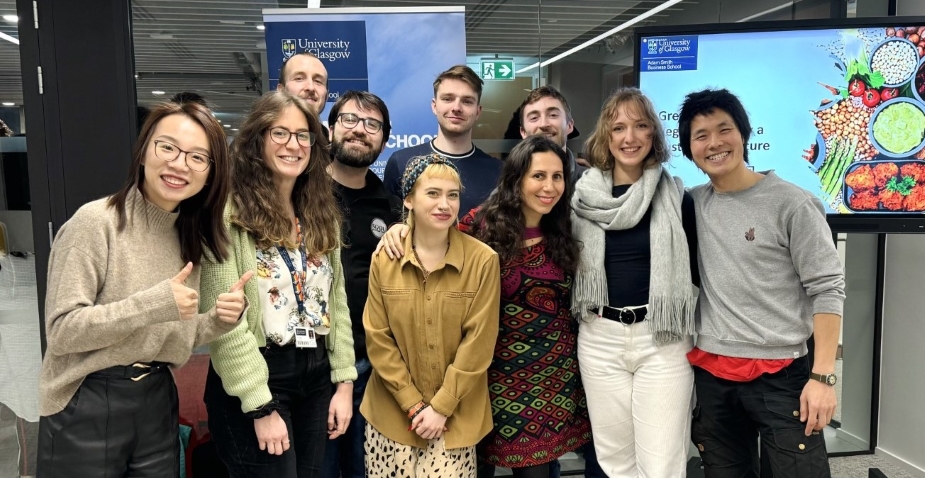GreenPalate Event: Vegan Living for a Sustainable Future | January 2024
Published: 16 February 2024
Organised by SCAF member Leyla Bragadin de Amicis, this event explored the relationship between sustainability and food supply, agriculture and veganism and navigating the vegan business terrain
The ‘GreenPalate: Vegan Living for a Sustainable Future’ event: How can we make veganism and plant-based diets thrive?
by Dr Leyla Bragadin de Amicis, Lecturer in Education | School of Education | University of Glasgow
On the 23rd of January, the Adam Smith Business School hosted the event ‘GreenPalate: Vegan Living for a Sustainable Future’ at the University of Glasgow. This initiative brought together University students, staff and the public to reflect on the challenges that veganism and plant-based diets still encounter in Glasgow, Scotland and worldwide. Although Glasgow is one of the leading cities for veganism in the UK, with the number of vegans increasing globally, key challenges at individual and societal levels must be considered to promote these lifestyles and diets effectively.
Veganuary 2024 supported 1.8 million people worldwide in trying to go vegan. Despite the extraordinary growth in popularity, people on a plant-based diet are still a minority. Although meat and dairy product consumption is one of the strongest contributors to biodiversity loss and climate change [1], the link between food diets and sustainability is rarely emphasised. Why is this link not discussed in the media and underplayed during COP28?
‘The Relationship Between Sustainability and Food Supply/Agriculture/Veganism’ Talk Session
Chaired by Dr. Leyla De Amicis, Lecturer in Education, University of Glasgow
Maddie Sinclair, PhD student in the School of Health and Wellbeing at UofG and member of the Healthy Cognition Lab and SCAF, presented her studies on how dietary guidelines scarcely report meat and dairy consumption recommendations and showed how people with different diets (meat-eaters, meat reducers and vegans) also interpret these guidelines differently. Abby Couture, Research Associate at the Bryant Research, reported empirical evidence on how peer influence, strategic messaging and labelling, marketing and institutional norms can increase plant-based food consumption. Couture also shared different approaches for enhancing the collaboration of markets and governments with more plant-based driven economies. Sam Eccles, Assistant Director for Stockfree Farming, explained his work with this Scottish-based charity, which assists individual farmers and crofters in the UK to transition out of livestock farming into alternative forms of land management, like stock-free organic farming and other sustainable and ethical land uses.

In image from left to right: Yingru Li, Maddie Sinclair, Alberto Casotto, Francesco Cappellini, Abby Couture, Tyler Lewington, Leyla de Amicis, Sam Eccles, Marlene Mamia, Andrew Yeung
‘Navigating the Vegan Business Terrain’ panel discussion
Led by Dr. Yingru Li, Senior Lecturer in Financial Accounting at the UofG Adam Smith Business School
Five representatives of vegan local businesses in Glasgow took part in this panel discussion: Andrew Yeung from VeganWheels, a food delivery cooperative whose bike riders support vegan restaurants/cafes, in the city; Marlene Mamia, founder of TheDorkyFrench vegan bakery, a takeaway café producing French vegan pastries; Alberto Casotto and Francesco Cappellini, Founder and Director of Sgaia Foods, producing and delivering also plant-based food (e.g. ragù and burgers), and Tyler Lewington, owner of The Glasvegan, a popular café in Glasgow City Centre.
After explaining the inspiration behind their personal stories in running vegan businesses, the panellists expressed their concerns and difficulties coping with financial constraints due to economic recession and inflation with competition from multinationals producing large-scale and cheaper plant-based products. They noted how many local businesses closed in the last months. Although expanding the plant-based industry is important, protecting local, creative, artisan and healthy plant-based products is also essential to promote vegan food alternatives and economies. All the panellists were proud of being part of a growing movement, promoting vegan values, supporting each other, and were optimistic about the future of veganism in our communities. However, we can still ask ourselves what support we can provide to vegan local businesses as individuals, customers or researchers.
Dulcis in fundo…
At the end of the event, attendants had the opportunity to taste and rate delicious plant-based dishes provided by the UofG Catering Services and snacks provided by Sgaia. Networking with various vegan organisations (e.g., Vegan Society, SCAF, Plant-based University team, Human Wildlife Solutions) was refreshing (a massive thanks for the organisation to the Business School administrative team, including Laura Ann Gallagher, Sarah Young and Caralin Montgomery-Cichy). Despite some challenges, there is real hope for a more plant-based future!
Reference
[1] Scarborough, P., Clark, M., Cobiac, L. et al.Vegans, vegetarians, fish-eaters and meat-eaters in the UK show discrepant environmental impacts. Nat Food 4, 565–574 (2023). https://doi.org/10.1038/s43016-023-00795-w
This blog is authored by a SCAF member and may not reflect the views and opinions of the wider SCAF membership.
First published: 16 February 2024
<< Blog

